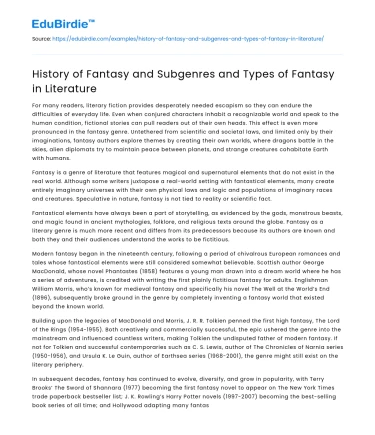For many readers, literary fiction provides desperately needed escapism so they can endure the difficulties of everyday life. Even when conjured characters inhabit a recognizable world and speak to the human condition, fictional stories can pull readers out of their own heads. This effect is even more pronounced in the fantasy genre. Untethered from scientific and societal laws, and limited only by their imaginations, fantasy authors explore themes by creating their own worlds, where dragons battle in the skies, alien diplomats try to maintain peace between planets, and strange creatures cohabitate Earth with humans.
Fantasy is a genre of literature that features magical and supernatural elements that do not exist in the real world. Although some writers juxtapose a real-world setting with fantastical elements, many create entirely imaginary universes with their own physical laws and logic and populations of imaginary races and creatures. Speculative in nature, fantasy is not tied to reality or scientific fact.
Save your time!
We can take care of your essay
- Proper editing and formatting
- Free revision, title page, and bibliography
- Flexible prices and money-back guarantee
Fantastical elements have always been a part of storytelling, as evidenced by the gods, monstrous beasts, and magic found in ancient mythologies, folklore, and religious texts around the globe. Fantasy as a literary genre is much more recent and differs from its predecessors because its authors are known and both they and their audiences understand the works to be fictitious.
Modern fantasy began in the nineteenth century, following a period of chivalrous European romances and tales whose fantastical elements were still considered somewhat believable. Scottish author George MacDonald, whose novel Phantastes (1858) features a young man drawn into a dream world where he has a series of adventures, is credited with writing the first plainly fictitious fantasy for adults. Englishman William Morris, who’s known for medieval fantasy and specifically his novel The Well at the World’s End (1896), subsequently broke ground in the genre by completely inventing a fantasy world that existed beyond the known world.
Building upon the legacies of MacDonald and Morris, J. R. R. Tolkien penned the first high fantasy, The Lord of the Rings (1954-1955). Both creatively and commercially successful, the epic ushered the genre into the mainstream and influenced countless writers, making Tolkien the undisputed father of modern fantasy. If not for Tolkien and successful contemporaries such as C. S. Lewis, author of The Chronicles of Narnia series (1950-1956), and Ursula K. Le Guin, author of Earthsea series (1968-2001), the genre might still exist on the literary periphery.
In subsequent decades, fantasy has continued to evolve, diversify, and grow in popularity, with Terry Brooks’ The Sword of Shannara (1977) becoming the first fantasy novel to appear on The New York Times trade paperback bestseller list; J. K. Rowling’s Harry Potter novels (1997-2007) becoming the best-selling book series of all time; and Hollywood adapting many fantasy stories into hit films and television shows.






 Stuck on your essay?
Stuck on your essay?

